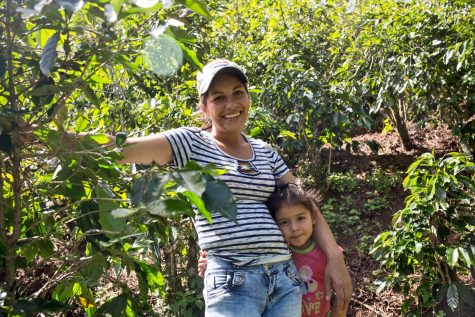Unfair trade is at the root of poverty

Forced to leave home
Olga Alvarado was just 18 years old when she immigrated to the US to work and save money to buy her own land for coffee farming back in Honduras. At the time, coffee prices in Honduras were very low and turned little profit for farmers, making it nearly impossible for Olga to stay in her home country and still earn a living wage to support her family as a single mother.
For eight years, Olga worked at a McDonalds in Devon, New Jersey and saved as much money as possible. In 2015, Olga’s hard work paid off. She bought six acres of farmland, returned home to Honduras, and joined the COAQUIL Coffee Collaborative, where Olga is now paid a sustainable price for her coffee. Her story is far from uncommon. Once she joined the COAQUIL co-op, she learned that about half of her fellow members had also previously immigrated to the US to earn more money.
While Olga’s story is inspirational, we believe that people shouldn’t have to leave their homes simply to earn a decent income. For people like Olga and the millions of other smallholder farmers across the world, they did not have a choice. Poverty is what forces folks to leave their homes in search of a better life. And ultimately, unfair trade practices are a root cause of poverty.
“My hope for my children is to get them ahead. That they don’t migrate to another country. Have something for them that they could overcome here and teach them what I am learning, so that in the future, they can do what I am doing now,” said Olga.
Unfair trade isn’t a new problem
Unfair trade has historically worsened poverty across many commodity sectors. One clear example lies within the banana trade. Bananas are the most popular fruit in the US with the average American consuming about 27 pounds of bananas annually. Like many other agricultural commodities, bananas have a fraught history associated with US and European colonialism and the effects of this history are still impacting banana farmers today.
In recent years, global banana prices were already pushed down because stores compete on low-cost bananas. They use bananas as loss-leaders in their stores to attract more shoppers, and as a result negotiate for lower prices from banana suppliers. These prices have not covered the uptick in production and export cost. As a result, the financial burden is now falling back on banana farmers.
“There is a legitimate high risk of families losing their farms and widespread job loss in regions where there aren’t many alternatives for earning an income,” said Silvia Campos Malpartida, Fairtrade International’s Senior Advisor and Global Product Manager for Bananas.
What’s happening now
To this day, workers are still subjected to low wages and unsafe working conditions, and sexual harassment and child labor are widespread. Banana-producing countries like Costa Rica, Ecuador, Guatemala, and Honduras have labor laws and worker protections that often go unenforced. As a result, large corporations often exploit those laws to continue running shady operations. For example, some employers continuously rehire employees on short-term contracts rather than grant them permanent employment. This allows them to avoid paying for legally mandated benefits. It also prevents employees from organizing and collectively bargaining for better working conditions.
Fairtrade has standards to address labor issues. Fairtrade sets a minimum price that producers must be paid per box, plus an extra $1 per box in Fairtrade Premium, which farmers use to invest in projects of their choice for their business or community. Freedom of association with union rights and collective bargaining is also required as part of our Standards. We collaborate with existing trade unions to create supportive systems for workers rather than duplicating efforts.
Additionally, Fairtrade works with with producers and commercial partners to make real progress toward living incomes and living wages. For workers on banana farms, we have set requirements that farms pay at least 70 percent of their country’s living wage benchmark – even if the country’s minimum wage is lower.

There is a fairer path forward
Fairtrade alone can’t solve every problem, it can make a difference so that people don’t need to resort to drastic measures – like leaving their homes – to improve their livelihoods. Fairtrade ultimately focuses on pricing and basic human rights. We know that when farmers are paid a fair price for their products, they can afford things like decent housing, education, and innovations to their business. Farmers and workers can live and thrive rather than just survive.
Ultimately, we everyone can all help drive positive change against global poverty by choosing Fairtrade certified products. To earn living wages, farmers must receive a fair price for their products based on their costs of sustainable production – and that means selling enough of their products on Fairtrade terms. By supporting Fairtrade, you are putting more bargaining power back into the hands of farmers and workers and investing in a global system built to make fair trade the norm.
We’re in this together
Fairtrade America partners with brands on the journey to certification and beyond. We can help with everything from finding a certified supply chain to marketing your newly certified product.
Get in Touch





